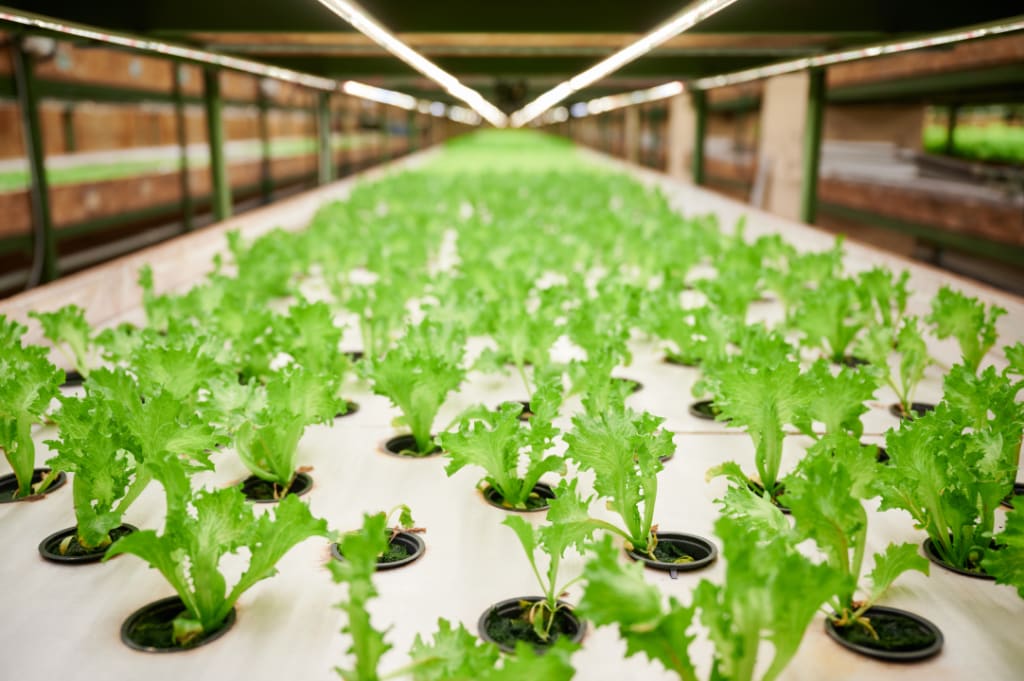
What is hydroponics?
Hydroponics is a method of growing plants using nutrient-rich water solutions instead of soil. This method of agriculture allows for the cultivation of plants in a controlled environment, such as a greenhouse or indoor facility, using artificial light and temperature control to optimize growth.
In hydroponics systems, plants are grown in containers filled with an inert growing medium, such as perlite, vermiculite, or coconut coir, which helps to anchor the plants and retain moisture. The plants are fed a nutrient solution that is delivered directly to their roots, providing them with all the necessary minerals and nutrients they need to grow.
There are several advantages to hydroponics farming. Because the growing environment can be carefully controlled, it is possible to grow a wide variety of crops year-round, regardless of weather conditions. Hydroponics systems also use less water than traditional farming methods because the water is recirculated and reused, and they can be more efficient in terms of space, as plants can be grown in a smaller area compared to traditional farming methods.
What are the advantages of hydroponics farming?
1. Controlled environment: The growing environment in hydroponics systems can be carefully controlled, allowing for the cultivation of a wide variety of crops year-round, regardless of weather conditions.
2. Greater efficiency: Hydroponics systems can be more efficient in terms of space, as plants can be grown in a smaller area compared to traditional farming methods. They also use less water than traditional farming methods because the water is recirculated and reused.
3. Higher crop yields: In a controlled environment, plants can grow more quickly and produce higher yields compared to traditional farming methods.
4. Pest and disease control: By growing plants in a controlled environment, it is possible to reduce the risk of pests and diseases, which can damage crops and reduce yields.
5. Greater crop diversity: Hydroponics systems can be used to grow a wide variety of crops, including those that are not well-suited to the local climate.
6. Urban agriculture: Hydroponics systems can be used in urban areas to grow fresh produce, providing a source of fresh, locally-grown produce in areas where it may not be possible to grow crops using traditional methods.
7. Food security: Hydroponics systems can be used to grow crops in areas that are prone to drought or other environmental challenges, helping to ensure a stable food supply.
Are hydroponics vegetables healthy?
There is no evidence to suggest that vegetables grown using hydroponics methods are less healthy than those grown using traditional farming methods. In fact, some research suggests that hydroponics systems may be able to produce vegetables with higher levels of some nutrients, such as vitamin C and certain amino acids, due to the controlled growing environment and the ability to carefully regulate the nutrient solution provided to the plants.
However, it is important to note that the healthiness of vegetables depends on a variety of factors, including the quality of the nutrient solution used and the overall growing conditions. For example, if the nutrient solution is not properly balanced or if the growing environment is not properly maintained, the resulting vegetables may not be as healthy as those grown using other methods.
Overall, it is important to choose a wide variety of fresh, nutrient-rich vegetables as part of a healthy diet, regardless of whether they are grown using hydroponics or traditional methods.
Conclusion
In conclusion, hydroponics farming is a method of growing plants using nutrient-rich water solutions instead of soil. It allows for the cultivation of a wide variety of crops in a controlled environment, and can be more efficient in terms of space and water use compared to traditional farming methods.
However, hydroponics systems can be expensive to set up and maintain, and they require a consistent supply of electricity to operate. While there is no evidence to suggest that vegetables grown using hydroponics methods are less healthy than those grown using traditional farming methods, the healthiness of vegetables depends on a variety of factors, including the quality of the nutrient solution used and the overall growing conditions.
There are also several costs and challenges associated with hydroponics farming, including initial setup costs, ongoing maintenance costs, energy costs, limited crop diversity, and the risk of nutrient imbalances.
About the Creator
Enjoyed the story? Support the Creator.
Subscribe for free to receive all their stories in your feed. You could also pledge your support or give them a one-off tip, letting them know you appreciate their work.





Comments
There are no comments for this story
Be the first to respond and start the conversation.